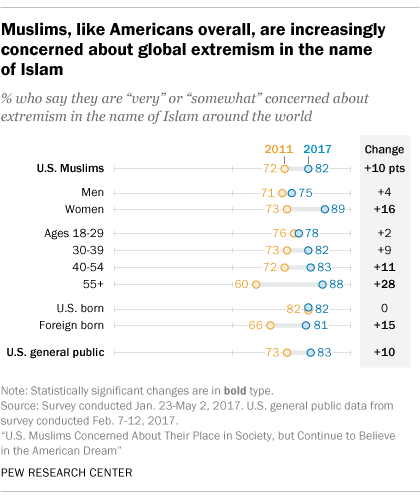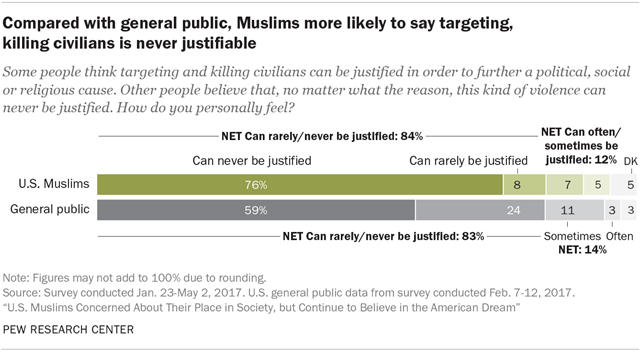
Most Americans are worried about Islamic extremism, and most Muslim Americans share these concerns.
About eight-in-ten U.S. Muslims (82%) say they are either very (66%) or somewhat concerned (16%) about extremism committed in the name of Islam around the world, about the same as the share of the general public that feels this way (83%), according to a new Pew Research Center survey. Only about one-in-six U.S. Muslims (17%) and Americans overall (15%) say they are “not too” or “not at all” concerned about extremism carried out in the name of Islam worldwide. Among both groups, concern about extremism is up 10 percentage points since the Center’s last survey of U.S. Muslims in 2011.
Muslim American women are particularly worried about global extremism in the name of Islam. Nearly nine-in-ten U.S. Muslim women (89%) say they are at least somewhat concerned about it, up 16 points since 2011. A smaller share of U.S. Muslim men (75%) say they feel this way.

While U.S. Muslims are slightly less worried about Islamic extremism in the United States than around the world, their concern about domestic extremism is still high. About seven-in-ten American Muslims (71%) say they are at least somewhat concerned about extremism in the name of Islam occurring in the U.S. As with global extremism, the level of concern among Muslim Americans about extremism in the U.S. is very similar to the general public’s (70%).
Despite their concerns about Islamic extremism, only 17% of Muslim Americans say there is a great deal (6%) or fair amount (11%) of support for extremism among U.S. Muslims. Most say there is not much support for extremism (30%) or none at all (43%) among the U.S. Muslim community. This contrasts with the views of Americans in general. Compared with Muslims, twice as many people in the general public (35%) say there is at least “a fair amount” of support for extremism among Muslims who live in the U.S.

Muslim Americans also differ from the general public in their views on undercover sting operations and other police efforts to disrupt terrorist plots. Four-in-ten U.S. Muslims (39%) say that when law enforcement officers have arrested Muslims on suspicion of plotting terrorist acts, they have mostly arrested “violent people who posed a real threat.” But 30% say such arrests have mostly involved “people who were tricked by law enforcement and did not pose a real threat,” while an additional 30% say they are not sure or express no opinion.
The general public is less divided on this question: 62% of U.S. adults say anti-terror arrests have mostly stopped real threats, while only 20% say authorities mostly have entrapped people who did not pose a real threat.
Both Muslims and the general public also were asked if there are circumstances under which targeting and killing civilians can be justified in order to further a political, social or religious cause. Roughly eight-in-ten U.S. Muslims (84%) say such tactics can rarely (8%) or never (76%) be justified. The share of Muslims who say such tactics can often or sometimes be justified (12%) is similar to the share saying this among the general public (14%). And Muslims are more likely than the public as a whole to say that targeting civilians for political, social or religious causes can never be justified.
